GuideofEngland.com
Independent guides for the modern tourist
GuideofEngland.com
Independent guides for the modern tourist
Salisbury, Wiltshire: an independent tourism guide for 2026
The cathedral city of Salisbury is steeped in history and is one of the finest tourist destinations in Wiltshire.
The city retains much of its medieval centre, with a delightful market square and traditional shopping streets, which lead to the magnificent cathedral. Salisbury cathedral is visually stunning, the colossal spire stands at 123m, while the front façade is ornately carved. Housed in the cathedral is the world's oldest clock and the Magna Carta, an ancient (1215) charter that details the power (and limits) of the King.
Salisbury is a calm a peaceful city, which reflects the rural nature of the region. There are scenic footpaths across the meadows to Harnham, there are the ruins of Old Sarum high above the city or the delightful park (known as Cathedral Close) that surrounds the cathedral.
Salisbury is famed for Stonehenge, the wonderful Neolithic stone circle that is 12km north of the city, and can be easily reached from Salisbury by a regular bus service.
There is a lot to see and do in Salisbury, and the city makes for a fantastic day trip or base from which to explore Wiltshire. This guide will show you why you should visit Salisbury and how to get the most from your trip here.
Highlights of Salisbury
Salisbury Cathedral - Arguably England's finest cathedral, containing Britain's most important document (the Magna Carta) and the world's oldest working mechanical clock.
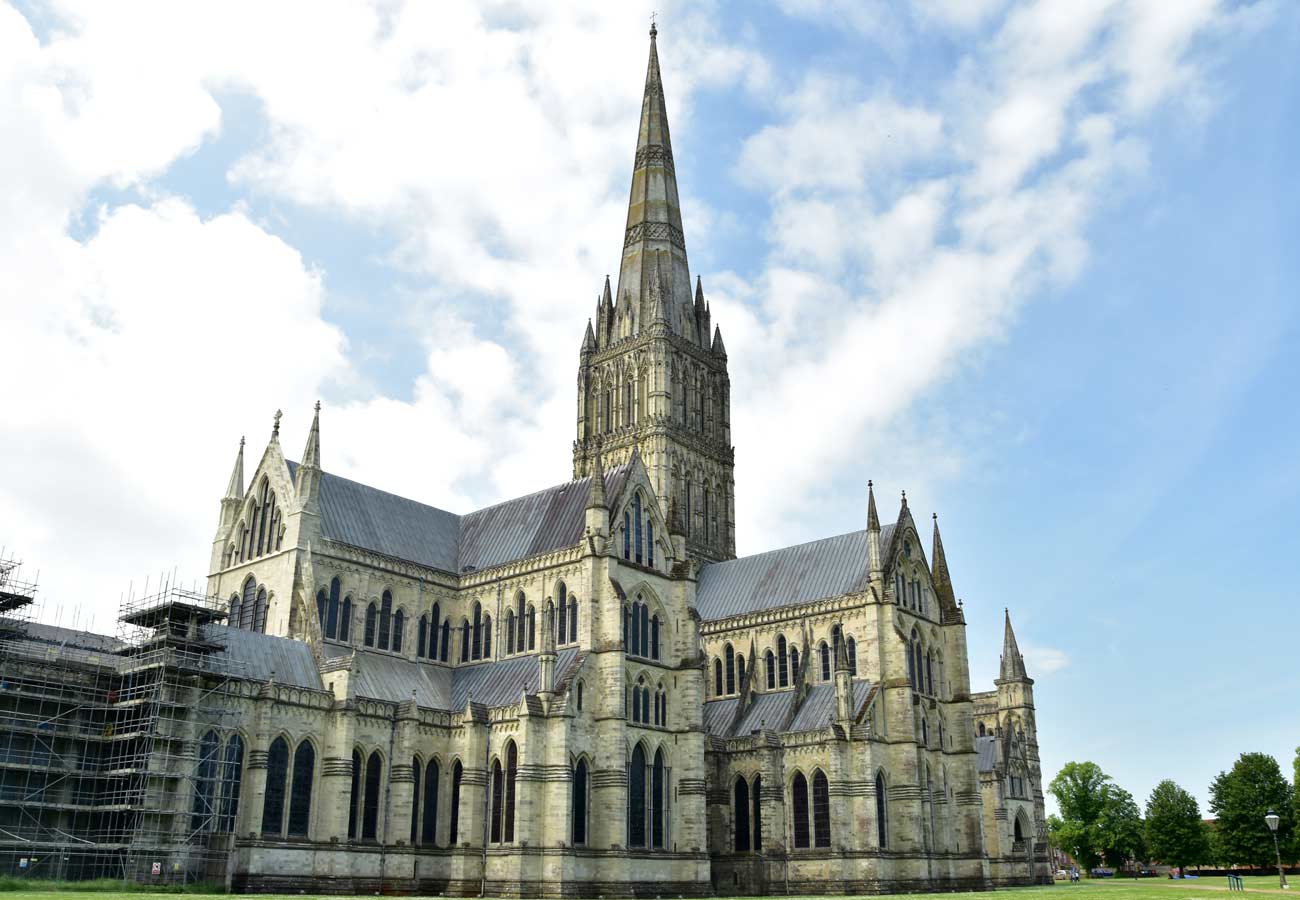
The Town Path - A delightful footpath that crosses the river meadows and provides the finest views of the cathedral, and ends at the delightful Old Mill pub.
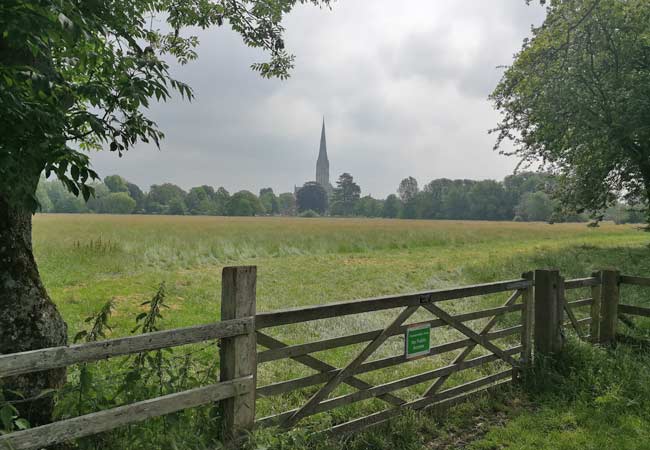
Butcher Row - The most characterful shopping street of Salisbury, historically the street where butchers were based, with the Guildhall at one end and the Poultry Cross at the other.
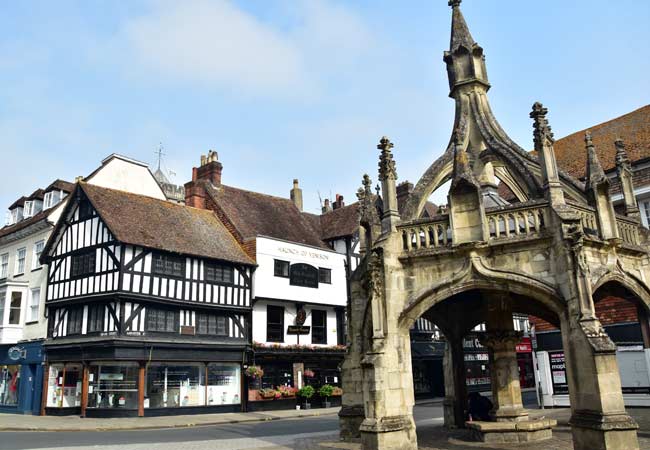
Stonehenge - The world's greatest prehistoric monument and is why most foreign visitors travel to Salisbury.

A day trip to Salisbury
Salisbury is an outstanding destination for a day trip.
The compact city centre can be easily explored in a few hours of sightseeing. The majority of the time will be spent in the city centre and the cathedral complex, which is just to the south of the city centre. The later part of a day trip could include Old Sarum or have a walk into the countryside.
If you are planning to visit Stonehenge, it is advisable to go in the morning when it is less busy, and have lunch and the afternoon in Salisbury.
Below is an interactive map displaying a suggested tour of Salisbury, which also details the highlights of the city.
Sights of Salisbury: 1) Poultry Cross 2) Market Square 3) The Guildhall 4) Butcher Row 5) High Street Gate 6) Salisbury Cathedral 7) Salisbury Museum 8) Arundells House 9) Mompesson House 10) The Town Path 11) The Old Mill Pub 12) Old Sarum Castle ruins 13) Old Sarum Cathedral ruins
Note: Zoom out to see points 12 and 13
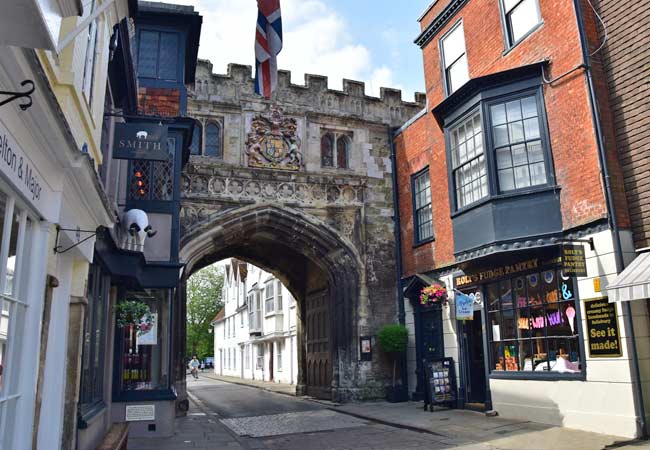
The High Street Gate into Cathedral Close
Practicalities for a day trip to Salisbury
Salisbury is situated on the main train line connecting London to the southwest, and there are direct services from London Waterloo station (1hour30min). Salisbury train station is to the west of the historic centre and is just a 10-minute walk.
If you are driving, there is a large car park called "Central Car Park" (postcode SP2 7RW) just to the west of the city centre, and it is the most convenient location to park. Make sure you park in the "long stay" section if you are planning to be longer than three hours in the city.
Salisbury has a decent selection of restaurants and cafes, but the aspect that the city excels at are the traditional and characterful pubs. These include the "New Inn", "The Ox Row Inn", "The Bishops Mill", and "The Wig and Quill".
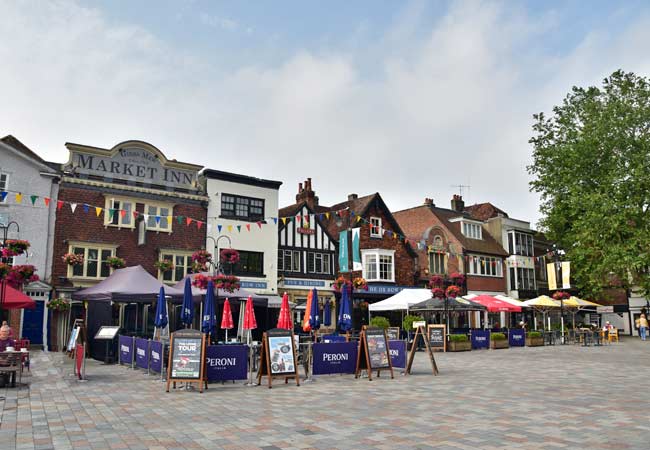
Salisbury Cathedral
Salisbury cathedral towers over the city, due to its massive spire, and sits a delightful walled area of the city known as "The Cathedral Close "
Salisbury cathedral was constructed in 1220 after the city was moved from Old Sarum, and it was completed in only 38 years. Being constructed in such a short space of time, the cathedral is just a single architectural style (Early English Gothic). This is unique for English cathedrals which commonly were constructed over many centuries and incorporated different design styles.
Adjoining the cathedral is a gothic cloister and a beautiful Chapter house (that was remodelled in 1859) that exhibits the Magna Carta.
A £9.00 admission fee must be paid to enter the cathedral and Chapter house, but inside, enthusiastic and helpful staff readily explain the details of the cathedral. The cloister is free to view, and there is a decent café in the old refectory.
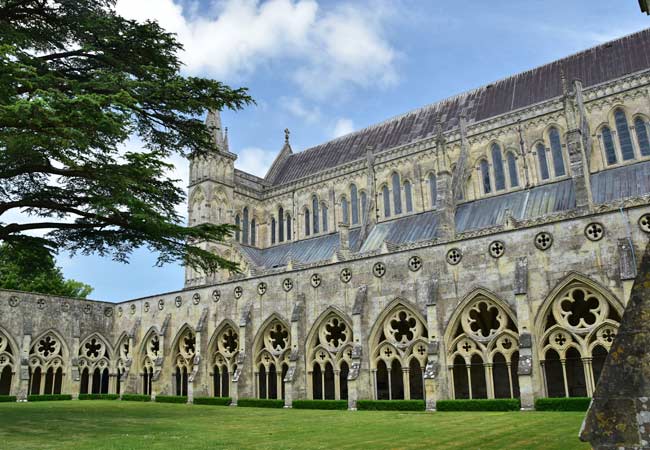
The cloister of Salisbury cathedral
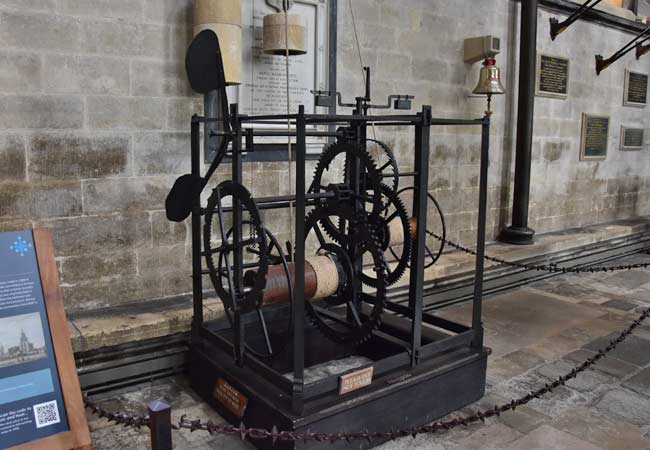
The world's oldest mechanical clock, which is still operational
The Magna Carta
The Magna Carta, written in 1215, details the power of king with respect to his barons. The key aspect is that everyone, including the king, is subject to the law. For the medieval period, this was a remarkable concept and later shaped British politics and law.
There were multiple copies of the Magna Carta written, but the best-preserved version is exhibited in Salisbury Cathedral. The document is surprisingly small, with meticulous tiny font written by scribes over 800 years ago. The Magna Carta small size was due to the high cost of the sheepskin parchment that it was written on.

The Magna Carta is exhibited in the Chapter house
The Cathedral Close
During the construction of the cathedral in 1220, Bishop Richard Poore encouraged the clergy to move to the new cathedral by gifting the land that surrounded it. On each of the plots, medieval houses were constructed, and this later became the wealthiest section of the city. Cathedral Close is separated from the rest of the city by a wall, and historically the four gateways were "closed" at night (hence the name Cathedral "Close").
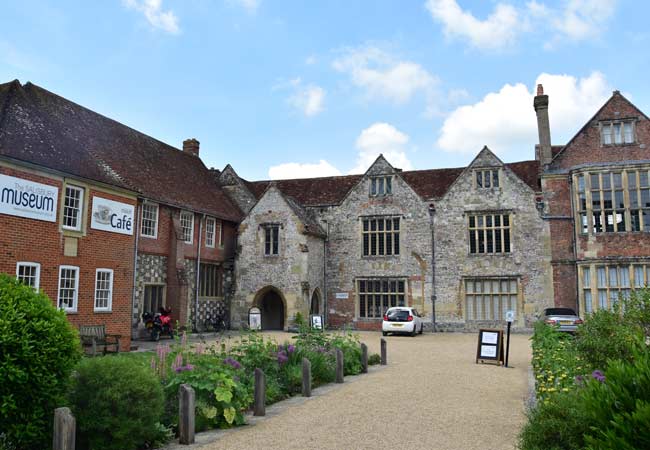
Salisbury Museum centred around one of the medieval houses
Today Cathedral Close is filled with museums, tea rooms and private houses, and is a delightful area of the city. Notable buildings include Salisbury Museum, The Wardrobe (the 14th-century building that stored the bishop's robes), Mompesson House, and Arundells (the former house of Prime minister Edward Heath)
On a summer's day, there is no better place in Salisbury to relax or have a picnic than on the lawns of Cathedral Close, in front of the cathedral.
Here is a list of external links to the museums and houses of Cathedral Close:
Arundells House
Mompesson House (National Trust)
Salisbury Museum
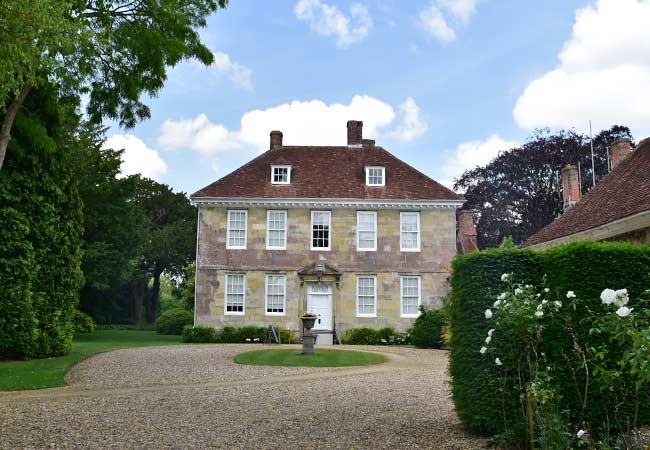
Arundells – A grand Georgian house
Old Sarum
The original site of Salisbury was at Old Sarum, with a settlement at the top of the hill since the Iron Age.
The cathedral was relocated to its current site in 1220 after Bishop Richard Poore fell out with the "un-holy" Norman soldiers who resided in the castle. Also, the supply of water to Old Sarum was limited, which compound the disagreements between the church and soldiers. By the mid-14th century, Old Sarum castle and village were completely abandoned.
Today found at Old Sarum are the ruins of the medieval castle and cathedral. All that is visible of the cathedral are the foundations, while the remnants of the castle are hidden behind a moat and defensive hill. From the top of the hill are wonderful views over the entire region.
Old Sarum is historically important, but for the casual visitor, there is not much to see.
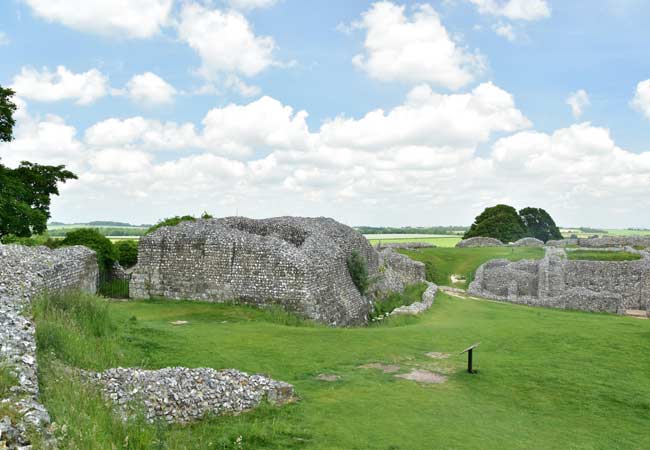
The ruins of Old Sarum castle – The castle and cathedral were dismantled to build the houses in Cathedral Close
Stonehenge
Stonehenge is one of England's most famous monuments, and if you are new to the region, you will probably be wanting to visit.
The stone circle is impressive when you consider its age, and the precise alignment to astrological events, but as a tourist attraction, you may feel underwhelmed and ripped off. The entrance fee is an over-inflated £30, the pathway around the stone circle is unnecessary far from the stones, and the museum section is padding to justify the entrance fee.
To travel from the train station to Stonehenge, you will need to catch the "Stonehenge tour bus" (operated by Salisbury Reds buses). This again is very expensive, with a return costing £15 (it does include a stop at Old Sarum) - further information can be found on their website: https://www.thestonehengetour.info/
Advice: If you have a car considering visiting Avebury instead of Stonehenge. Avebury stone circles are much older, you can respectively touch the stones, and it is free to visit.
Related articles: Avebury guide
Salisbury walks
For a day trip to Salisbury, the two best walks of the city are around Cathedral Close or along the Town Path to Harnham.
The Cathedral Close route of 1.5km follows the eastern perimeter wall (down Exeter Street) and enters the Close complex via "De Vaux Place Gateway" before heading north to the lawns and cathedral.
The Town Path provides one of the finest views of the cathedral, and was the inspiration John Constable's famous (1831) painting of Salisbury. The route heads south from the Queen Elizabeth Gardens on Mill Road, crosses the meadows and ends at the "Old Mill", a charming pub that was once a mill.
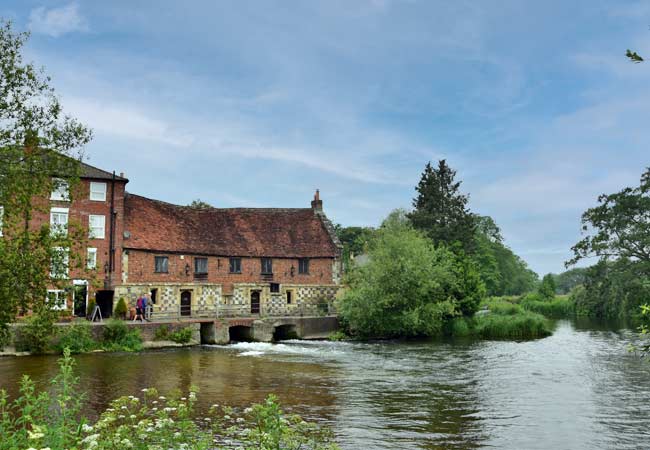
The Old Mill at the end of the Town Path
















